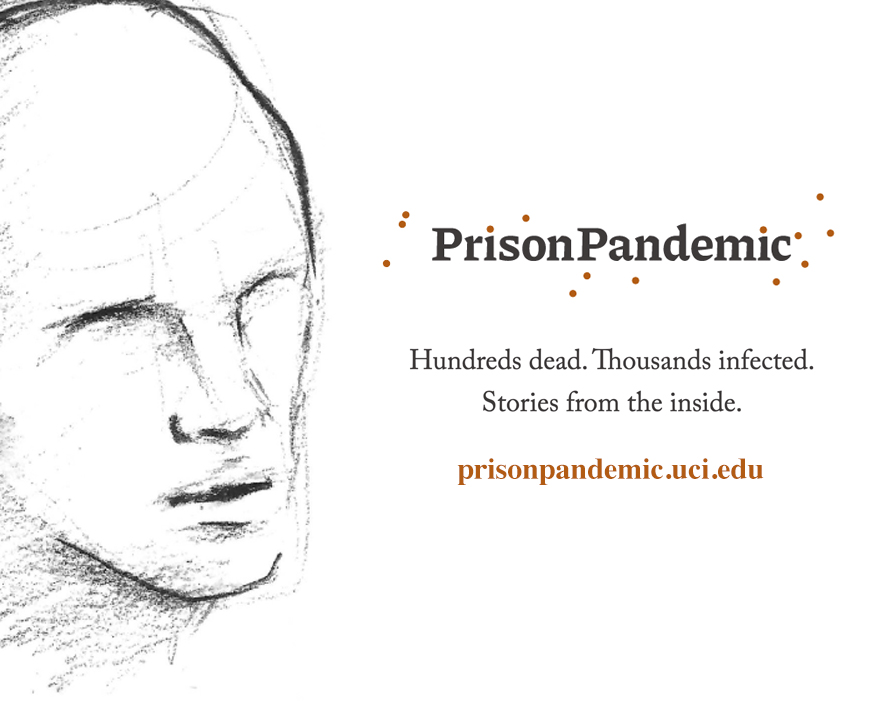Play explores UCI’s PrisonPandemic project

Play explores UCI’s PrisonPandemic project
- April 28, 2022
- 'COVID in Custody' recounts campus efforts to expose unsafe conditions
-----
The disembodied voices of incarcerated people – scared, pleading, angry, upset – will haunt a UCI play about the coronavirus in California’s crowded penitentiaries. Set to run April 29 through May 1 in the campus’s Little Theatre, “COVID in Custody” chronicles the real-life efforts of three UCI professors and a cadre of students to document how the pandemic has played out behind bars.
The faculty trio “went from academics to activists,” says drama professor Jane Page, who shares writing and directing credits on the play with her husband, Gavin Cameron-Webb.
What started in April 2020 with faculty op-eds about the threat of COVID-19 in jails and prisons soon evolved into a campus fundraiser to buy face shields and masks for incarcerated people and then into an online archive of more than 4,000 letters and phone calls from incarcerated people describing their pandemic experiences.
“What the professors did was incredible,” Page says, noting the logistical hurdles in setting up a hotline to accept collect calls from the different companies used across different jail and prison facilities and in enlisting scores of students to answer the phones and transcribe the conversations. “It’s nice to be able to recognize people who are making a difference.”
The script for “COVID in Custody” is taken from interviews that Page videotaped in her University Hills living room with the leaders of UCI’s PrisonPandemic project: Keramet Reiter, professor of criminology, law and society; Naomi Sugie, associate professor of criminology, law and society; Kristin Turney, professor of sociology; Joanne DeCaro and Gabe Rosales (formerly incarcerated himself), doctoral students in criminology, law and society; and Erin Secrist, who recently earned a bachelor’s degree in psychology.
But it’s not a conventional play with costumes, stage sets and characters moving around. Instead, half a dozen actors and a narrator will sit in chairs and read their lines, interspersed with recordings and letters from incarcerated people, a barrage of COVID-19 statistics, and projected images of state penitentiaries and news stories.
“Our team is very excited about the play, although I imagine it will be surreal to see actors portraying our parts,” says Reiter, who approached English professor and Shakespeare scholar Julia Lupton in November 2020 to brainstorm ways of publicizing PrisonPandemic.
Lupton promptly played matchmaker. “I really believe in the power of drama to bring hidden human lives into conversation and visibility, so it seemed like a great idea to introduce Keramet to Jane Page,” Lupton recalls. “As a theater maker, Jane is really committed to exploring questions around incarceration, immigration and social justice, and she also creates works in collaboration with community partners.”
Shortly after the introduction, Page began incorporating PrisonPandemic into her advanced directing class, assigning students to develop performance pieces inspired by the recordings of incarcerated people. “Some of the results were quite moving,” she says.
Last summer, Page decided to do a theatrical production of her own, in collaboration with Cameron-Webb, a British-born director she married in a Polish bakery in Denver in 1996. As of late March, they were still polishing the script while auditioning UCI students, faculty, alumni and professional actors for the cast.
When asked how long the staged reading would run, Page laughs and says, “We don’t know yet.” But Cameron-Webb predicts that the final version will clock in at 40 to 60 minutes.
Admission will be free, a preview performance on April 28 is likely, and the Saturday matinee will be followed by a talkback with the audience.
The goal of the play is “to raise awareness,” Cameron-Webb says. “During the pandemic, we chose to put incarcerated people in harm’s way, which is a rather startling indictment.” (As of mid-April, the California prison system had recorded more than 73,000 COVID-19 cases and 253 deaths.)
Page adds, “people in prison are still somebody’s father, sister, grandparent or child. Their stories need to be heard.”
-----
Would you like to get more involved with the social sciences? Email us at communications@socsci.uci.edu to connect.
Share on:
Related News Items
- Careet RightUCI sociologists earn American Sociological Association honors, leadership roles
- Careet RightMultiple honors for UCI soc sci's Maricela Bañuelos
- Careet RightCOVID ravaged Indiana's prisons
- Careet RightCalifornia's prison death rates rose amid COVID
- Careet RightCOVID prison death rate increased 3 times higher than broader population: study


